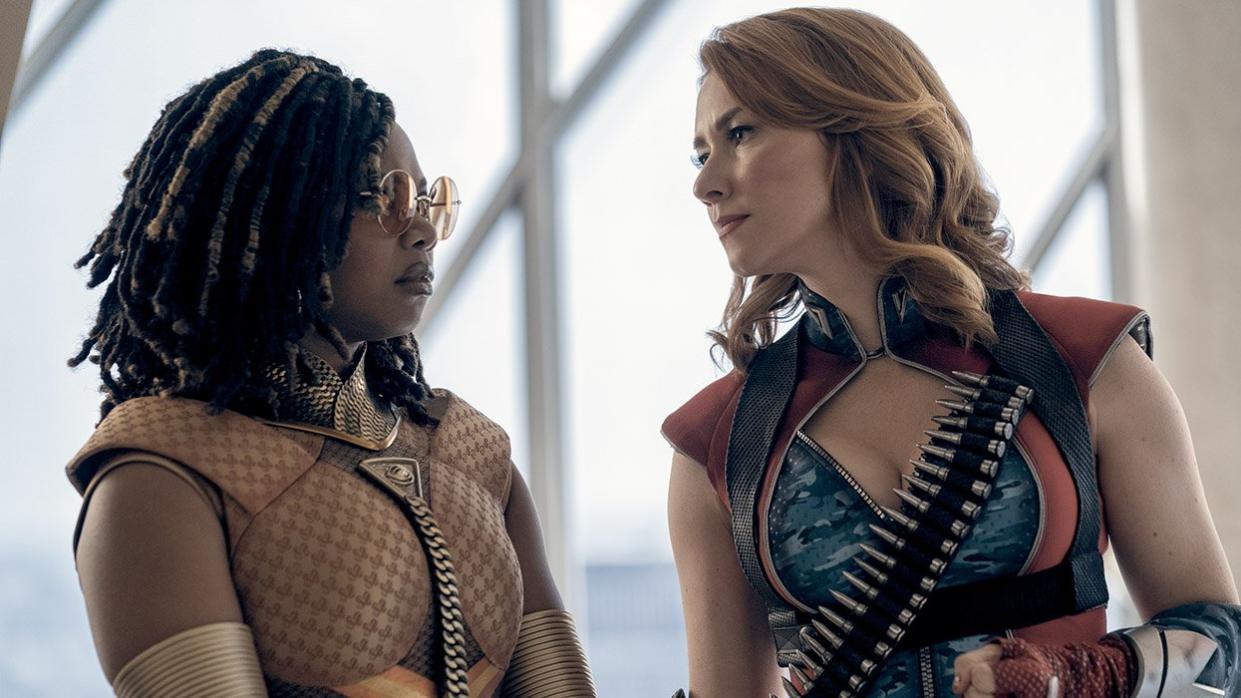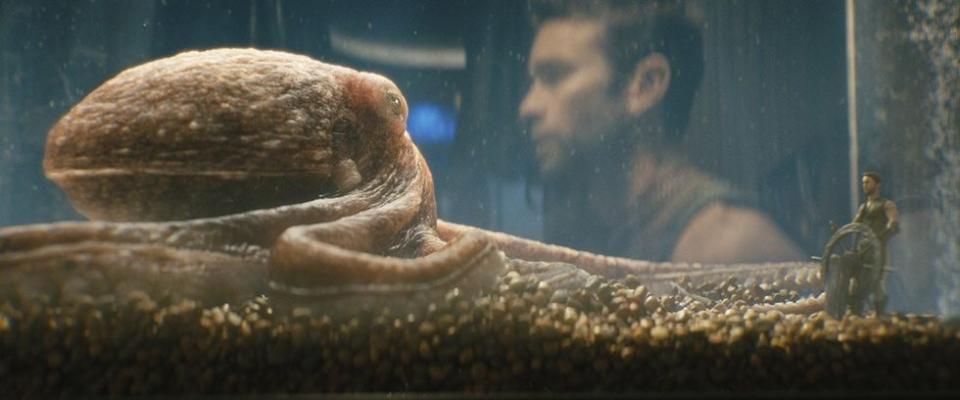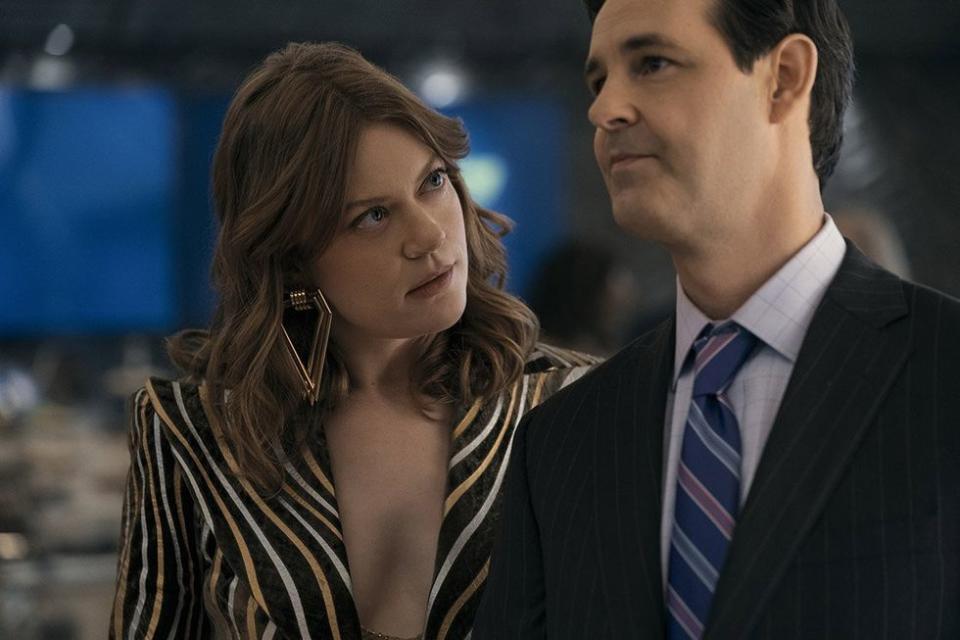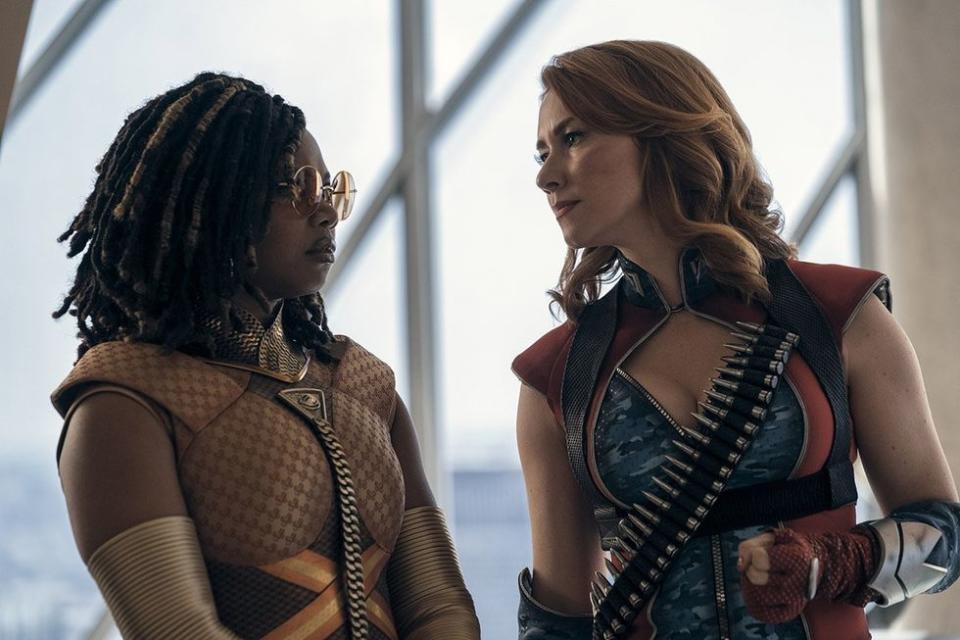'The Boys' baddies on why the show's secret super weapon is the complexity of its villains

- Oops!Something went wrong.Please try again later.
- Oops!Something went wrong.Please try again later.
- Oops!Something went wrong.Please try again later.
Season four of The Boys is here and it’s already causing quite an uproar. It’s always been a not-so-thinly veiled takedown of the most heinous parts of our political and social culture, but as real life careens wildly into a world of what would have once been seen as satire, The Boys feels ever more ripped from the headlines — and is all the better for it.
What’s incredible about The Boys, and has been from the start, is that it can somehow take some of the darkest and most frightening elements of modern American culture and filter them through the lens of a superhero satire. They become cathartic, entertaining, shocking, and laugh-out-loud funny instead of just profoundly distressing. That’s because no show strikes a balance between the profound and the profane, and because it always knows how to kick in the right direction: up.
Unless, of course, you’re just coming to the extremely late realization that hateful far-right ideology and rhetoric is what’s being parodied and made an absolute clown of, then you’re having a very bad week. And frankly PRIDE, along with creator Eric Kripke, are OK with that.
While the violence, sex, and characterizations can be cartoonish, the show maintains its groundedness through the psychology and motivations of its characters — even in its most heinous baddies like Homelander, who is equal parts Trump and the avatar of American imperialism and capitalism, and Firecracker, a Marjorie Taylor Greene style firebrand meets superhero sex doll. They could simply twirl their mustaches and chew up the scenery like one-dimensional baddies, but Kripke refuses to let his heroes or his villains become hollow tropes.

Courtesy of Prime Video
“Part of it stems from my sensibility as a writer and the other writers in the room. I just don’t understand villains, it doesn’t make sense to me that someone wakes up and they’re like, oh, I’m gonna be evil. So, anytime anyone does something bad I’m always like, ‘Oh, so what happened to make them think that that’s right?’ Because everyone’s the hero of their own story and everyone thinks they’re genuinely putting good into the world it’s just that sometimes that they’re completely wrong,” he tells PRIDE. “Their external reality doesn’t match their internal reality. I’m fascinated by that. What happened in Homelander’s life that made him the way he is? I don’t want anyone to sympathize with him and some of the right-wingers that do, I find it fucking horrifying, but I want everyone to understand him, just like any villain.”
Watch PRIDE's full interview with Antony Starr, Chace Crawford & Eric Kripke
The Boys’s Antony Starr, Chace Crawford & Eric Kripke talk complex villains & octopi love with PRIDE
It’s a sentiment that is not lost on Antony Starr, who brings Homelander to horrifying and compelling life on screen. “This is something that I actually care quite a lot about,” Starr tells PRIDE. ‘[Homelander] is the creation of incredible emotional and physical abuse and damage. The nature of the show — we’re not going to cry and plead for the bad guy — but as an actor, and working with this guy [points at Eric Kripke] around where we want to go with the character and how deep we want to go, which is as deep as possible.”
For Starr, the show’s willingness to dig deep into the motivation of its baddies, as misguided and horrific as they may actually be, is more than just an act of good writing, but a public good. “There’s something in there for me about the attention that we don’t give to mental illness, and people that are really, really struggling, which is something that I care about,” he shares. “I’ve been in and out up and down, like anyone else, no one escapes it will go up and down in our lives. That’s one of the things that I love being able to dabble in that world and really explore those areas and the parts of myself that are lighter.”

Courtesy of Prime Video
Starr recalls how prior to the show beginning filming on season three, he was tempted to go to Kripke with some private issues occurring in his life that could perhaps be integrated into the character this season. “I went, ‘You know what, don’t be that actor. Don’t be that actor.’ And then I read the first script and it was like, ‘We’re there.’ I swear to God, this really happened!” he recounts. “This synchronicity and the dovetailing that’s gone on through this show. I really appreciate that. I think that’s one of the reasons fans have gravitated towards these characters because of that alignment with us as people.”
He’s not wrong, but again it’s Kripke’s ability to walk the tightrope between the sincere and the irreverent. Take for instance Deep’s romance with an octopus named Ambrosius (voiced by none other than Tilda Swinton). Sure, Kripke makes a crack about Deep’s desire to “fuck octopi,” but Chace Crawford, who stars as the fish fetishist, jokes along before pausing to point out that even when exploring the absurd and even vulgar, character development and depth rules the day. “Honestly, that is the greatest thing, the writing is so great. They really let us and give us permission to do these things and show vulnerability and show these colors. Sometimes they have to pull me back a little bit because…we always want to be grounded, right, but Eric did come to me and was like before season three. ‘Have you seen My Octopus Teacher?’ I was like, ‘Oh no. Oh god, I haven’t. Where are we going with this?” he recalls with a laugh.
Watch PRIDE's full interview with Erin Moriarty, Karen Fukuhara & Claudia Doumit
‘The Boys’ Erin Moriarty, Karen Fukuhara & Claudia Doumit talk secrets & the patriarchy with PRIDE
Staying grounded is a note that Colby Minifie admits Kripke has given her as well. Minifie stars as Ashley Barrett, Vought International’s CEO, who is trapped in the gilded cage of the C-suite, and who vacillates between a foul-mouth dominatrix and pure terror — a role that calls for plenty of range, to say the least. “Ashley is one big cathartic character. I love playing her. I have a kind of a twisted sense of humor and quite a dirty sense of humor and on The Boys, they’re just like, yes, more. Thank you more, please. I can say whatever comes out of my face hole,” jokes Minifie to PRIDE. “Ashley is a character that is so much fun to play and has such a flamboyant sense of style. And is dealing with such high stakes and high stress all the time. It’s very easy for me to just kind of fall deep into that high drama, high comedy, they go hand in hand sometimes.”

Courtesy of Prime Video
One actor who did not get the “be more grounded” note was Valorie Curry, whose character, Firecracker, was introduced this season as a thinly — OK, not veiled at all — send-up of Majorie Taylor Green’s deranged brand of conservatism. It proved to be a unique experience for the actor. “In my career, I have done a lot of genre and other superhero and comic book IPs, and I am always the grounded one, the human one, the moral compass, the straight man. It gets so boring,” Curry tells PRIDE. “This is the first time I’ve been able to just go and find edges I didn’t know that I had, I’ve never gotten to be this big in so many directions on camera before.”
That’s not to say donning the persona of a Christian nationalist in Firecracker wasn’t a heavy character to carry for the out actor. “She is representative of some of the worst parts of our culture and culture as it’s emerging around the world. And then it’s also like literally the embodiment of the male gaze. I’ve never played a character that’s so hyper-feminine, hyper-sexualized, which is like perfect for her because she weaponizes It like she’s, she shouldn’t be that but oh my god. I kept saying by the end of the season, I was like, I just want to go be like a genderless gnome in the woods, which I am,” she laughs, “because it was just so much.”

Courtesy of Prime Video
This season also sees the introduction of another incredible villainess, Sister Sage, the smartest — and most amoral — woman in the world. For Susan Heyward, Sage’s ability to be so strategic when she discloses information proved to be cathartic for the actor. “Sage is very intentional about when she chooses to share things. It’s given me a sense of empowerment of timing and intention,” Heyward tells PRIDE. “I have a tendency to just poke my arms wide and share everything, and I’ve definitely had friends roll their eyes at me,” she, well, reveals.
Watch PRIDE's full interview with Colby Minifie, Susan Heyward & Valorie Curry
‘The Boys’s Susan Heyward, Colby Minifie & Valorie Curry talk the wicked joys of being bad to PRIDE
Sage is perhaps the most interesting character this season because she represents the true evil of neutrality in the face of fascism and capitalist greed. She’s the evil that stands by and does nothing at best, and who lends a helping hand without any compunction or conscience for entirely egomaniacal reasons. But as with all his villains, Kripke isn’t content to simply make her evil for the sake of being evil. There’s an exploration within the character of what it does to someone to be both the smartest and most capable person in every room and have that weaponized against you to the point of invisibility. What does it do to a person who is that gifted to be ignored? Marginalized? Dismissed? It’s a fascinating character study that would be worthy of its own spin-off, but here becomes a part of a tapestry of complex, flawed, and captivating characters.
Therein lies the power of The Boys. It's vulgar and crass in all the ways that make for a propulsive and cathartic watch, but there’s something far more profound below the surface of the gore and sophomoric humor. It’s a whip-smart satire brought to life by perhaps the greatest and most terrifying rogues gallery ever put to screen.

